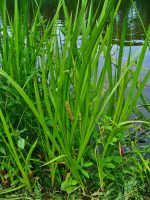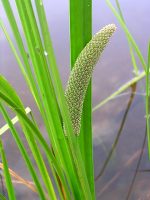 This aquatic perennial goes by many name including beewort, flag root, gladdon, myrtle flag, sweet flag, pine root, sea sedge and sweet cane. It is native to Asia and Europe where it grows at the edges of small lakes, ponds and rivers, marshes, swamps, and wetlands. Acornus calamus is one of only two species in the family, Acornaceae. Plants have a root system of branching rhizomes and form clumps of basal, sword-like leaves that resembles those of iris. They are up to 30″ long, are flattened, and have one wavy margin and a conspicuous midrib. A 2-4″ long spadix of inconspicuous greenish flowers appear in a diamond pattern in late spring to early summer. The fruit is a tiny fleshy berry.
This aquatic perennial goes by many name including beewort, flag root, gladdon, myrtle flag, sweet flag, pine root, sea sedge and sweet cane. It is native to Asia and Europe where it grows at the edges of small lakes, ponds and rivers, marshes, swamps, and wetlands. Acornus calamus is one of only two species in the family, Acornaceae. Plants have a root system of branching rhizomes and form clumps of basal, sword-like leaves that resembles those of iris. They are up to 30″ long, are flattened, and have one wavy margin and a conspicuous midrib. A 2-4″ long spadix of inconspicuous greenish flowers appear in a diamond pattern in late spring to early summer. The fruit is a tiny fleshy berry.

Historically, calamus has been used as a medicinal herb, and because the leaves and root stock have a pleasant fragrance when crushed they were used as a strewing herb and in perfume making. Other translations for the Hebrew word include sweet smelling cane, aromatic cane, fragrant cane, sweet myrtle, fragrant weed, and reed spice.
Exodus30.23 (NIV) Calamus is listed as one of the ingredients in holy anointing oil.
“Take the following fine spices: 500 shekels of liquid myrrh, half as much (that is, 250 shekels) of fragrant cinnamon, 250 shekels of fragrant calamus,”
Song of Songs 4.14 (NIV) The bridegroom describes the garden of his beloved .
“ nard and saffron, calamus and cinnamon, with every kind of incense tree, with myrrh and aloes and all the finest spices.”
Ezekiel 27.19 (NIV) Calamus is included among the articles for sale in Tyre.
“ and casks of wine from Izal in exchange for your wares: wrought iron, cassia and calamus.”
Isaiah 43.24 (NIV) God condemns the people for their failure to participate in worship.
“ You have not bought any fragrant calamus for me, or lavished on me the fat of your sacrifices. But you have burdened me with your sins and wearied me with your offenses.”
Jeremiah 6.20 (NIV) God warns that hypocritical worship will not prevent destruction.
“What do I care about incense from Sheba or sweet calamus from a distant land? Your burnt offerings are not acceptable; your sacrifices do not please me.”
Calamus like full sun to partial shade and moist to wet soil in USDA Hardiness zones 4-10. Plants do well in shallow standing water and are suitable for bog, rain, and the edges of water gardens. Propagation is by division of rhizomes; plants are healthy and have no significant pests or diseases.
The genus name, Acornus, is from the Greek word άχόρου derived from κόρη which means pupil of the eye and refers to the use of the root juice to cure eye diseases. The specific epithet, calamus, is from the Greek word kάλαμος meaning reed and refers to the appearance of the plant.